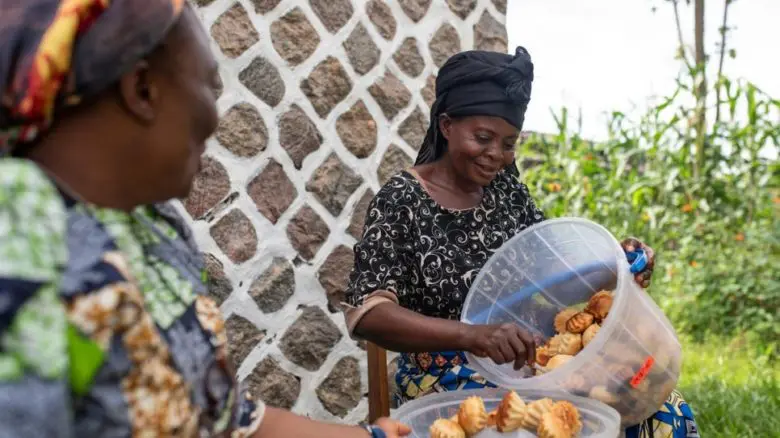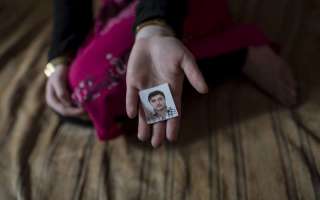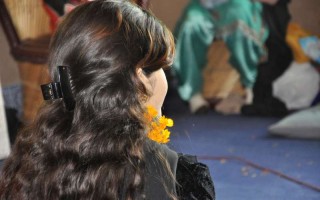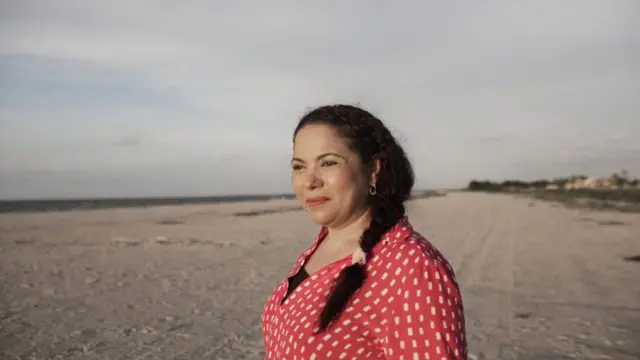
One of the women who teaches cookery at the centre serves cakes to Sister Adolphine, who oversees activities at the reintegration centre in Kananga. © UNHCR/Olivia Acland
Over 300 women survivors of sexual and gender-based violence are receiving training and psychosocial support to help them reintegrate into society.
By Robert Sibson in Kananga, Democratic Republic of the Congo
Hundreds of women are hard at work at the back of a hall, tucked away off a side street lined with banana trees in Kananga, in the Democratic Republic of the Congo’s Kasai-Central Province.
Fidèle, 36, watches intently as an instructor shows the group how to mix cake batter. The training is helping her focus on rebuilding her life after she was raped while travelling to Kananga with her six children, to visit her husband in hospital after he was injured in a mining accident.
“Something terrible happened on the way. We were stopped by a group of armed men. One of them took me to the bush and raped me several times,” she recalls.
Orphaned at a young age and illiterate, Fidèle faced the second most challenging moment of her life – she was rejected by her husband and her community and left alone in her trauma. Worse still, she was abandoned to fend for herself and her children. But then she received medical treatment from Médecins Sans Frontiers and was referred to the Mary, Mother of Hope Recovery and Reintegration Centre in Kananga, that’s supported by UNHCR, the UN Refugee Agency.
Here, groups of women are busy carving blocks of soap with a wire cutter, as others sit at the front of the hall in three rows, sewing dresses in quiet concentration. A couple of week-old babies sleep on knitted blankets at their mothers’ feet. Others like Fidèle, sit around a bucket of cake mix listening to their trainer.
“Something terrible happened on the way. One of them took me to the bush and raped me several times.”
In all, 300 women survivors of gender-based violence are receiving vocational training, psychosocial support and literacy classes, as part of UNHCR’s support project to help them and thousands of other survivors reintegrate into society. The six-month training programme also includes mechanics, electronics, information technology and small business management to help the women be self-reliant.
In 2016, conflict between government forces and tribal militias left the Greater Kasai region – already struggling with poverty and high rates of gender-based violence – deeply traumatised. According to OCHA, nearly 1.3 million people are internally displaced in the Greater Kasai region and tens of thousands more have fled into neighbouring Angola.
While the conflict ended in 2019, sexual violence and harmful traditional practices continue to be weaponized in the region today, notably related to ethnic and land disputes. This year alone, over 6,200 incidents of sexual violence were reported from January to September across the DRC.
“Thousands continue to endure extreme human rights abuses and heart wrenching violations, the most traumatising being sexual violence, which is a direct attack on the innermost core of any individual,” says Ali Mahamat, the Head of UNHCR’s sub-office covering the Kasai region.
He adds that thousands of women lost their children, fathers and husbands to the fighting, which “has left scars and unimaginable suffering.”
“Thousands continue to endure extreme human rights abuses, the most traumatising being sexual violence.”
“In a region where traditional custom stigmatises rape and sexual assault, most survivors are ostracised and pushed to the margins of society with no means of support and left desperately vulnerable,” he explains.
Since January this year, UNHCR has assisted nearly 10,000 women like Fidèle in the Kasai region. Psychologists and social workers are helping the women through their trauma and ensuring that they access important services like healthcare and education. Literacy classes are taught to complement the training, while UNHCR provides an emergency cash grant to assist with the most immediate needs.
“Helping the survivors of these terrible abuses to rebuild their lives and reintegrate into society is a key priority,” adds Mahamat. “Fortunately, we see that our projects are really changing lives for the better.”
Christine, 45, is a mother of nine and a survivor. Last year, she was a trainee but this year, she is back as a trainer, sharing her baking skills with the other women.
A scar on her neck points to a dark past; an injury sustained from a bayonet, when she was raped by armed men during fighting in the Nganza area of Kananga.
“I had nothing in my life after that. I couldn’t eat. Now, I can at least earn some money to help my children,” says Christine in a hushed, but determined voice.
Sister Adolphine, who oversees the project, refers to the Nganza area as ‘terre rouge’ – French for ‘red earth’ – because of the atrocities that occurred there. For her, the value of the vocational project extends far beyond the walls of the reintegration centre.
“This project does not just assist the women and the traders from whom they purchase the primary ingredients they need,” she explains. “It is helping them rebuild their lives and add value to their humanity because they are contributing to the well-being of the community. No matter how little!”
Sister Adolphine adds that the project brings meaning to families and the whole community benefits as a result.
“It gives us a sense of satisfaction to see how they can be impacted so positively by these activities,” she adds.
“It is helping them rebuild their lives and add value to their humanity.”
At the soap-making stand, Christiane, another trainer, explains how the mix of oil, water and lye is poured into two wooden compartment boxes before it solidifies and is cut into chunks. The pieces are sold for between US 13 cents and US 50 cents, depending on the sizes.
Behind her is a chalkboard with the letters of the alphabet.
“We use this to help explain letters and numbers to the women to help them sell their products,” she adds.
Four of the women break away from cutting the soap. One points at the letters on the chalk board before leading the group in song and dance.
“Ah! Beh! Ceh! Deh!” she sings loudly.
Sister Adolphine smiles as the women chime in.
“This is a family,” she says.
Originally published by UNHCR on 1 December 2020.





